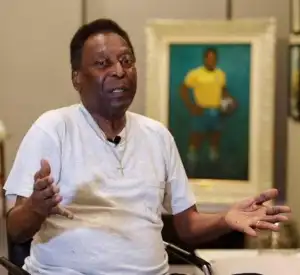About four (4) months after his death, the legend of world soccer Pele continues to be talked about. In fact, following a request from the mythical Brazilian club Santos FC (former team of King Pele) and the Pele Foundation, the word “peeled” has been admitted in the Portuguese language dictionary, in Brazil.
The topic “Pelé” is defined as “Something or someone who is out of the ordinary, something or someone who by its quality, value or superiority can not be equated to anything or anyone else, as Pelé, nickname of Edson Arantes do Nascimento (1940-2022), considered the greatest sportsman of all time,”. Writings reported in particular by RMC Sport.
The dictionary thus raises Pele to the highest rank, giving as an illustration the instructions for use of the popular expression: “He is the Pele of basketball. She is the Pelé of tennis.”
The family of the world soccer icon feels immense pride by this accomplishment of having “written the history and the name of the king of soccer” in the Portuguese language, spoken by more than 265 million people around the world.
Who was Pele?
Edson Arantes do Nascimiento, known as Pele, died on Thursday, December 29, 2022 at the Albert Einstein Hospital in Sao Paulo, at the age of 82. The soccer legend had been fighting colon cancer for about a year.
Pelé was born on October 23, 1940, in Três Corações, Minas Gerais, Brazil. His gift for soccer was detected early in his childhood. He quickly distinguished himself by shining in the youth categories in the offensive positions.
He began to write his legend early on by becoming the youngest player to win a World Cup in 1958 with the Seleçao, before going on to win two more FIFA World Cups, in 1962 and 1970. He is also the only soccer player to have won three World Cup titles (as many as Argentina, who recently won the title, and more than France, a finalist and two-time winner). He has scored 12 goals in 14 World Cup matches.
At the club level, Pele had no equal, winning all the major titles, collective and individual. If he didn’t win the Golden Ball, it’s only because he hadn’t played in Europe. His talent and versatility were undeniable. He led Santos FC to 11 Brazilian championship titles, 2 Intercontinental Cup titles in 1962 and 1963, 2 Copa Libertadores titles, also 1962 and 1963. At the individual level, Pele received the prestigious award of Athlete of the Century from the International Olympic Committee (IOC). He was also player of the century by FIFA and collected an honorary golden ball on January 13, 2014. In addition to being a member of the World Team of the 20th century.
Pele’s dimension went far beyond soccer. He was a true icon. So much so that he was chosen as an ambassador by the UN and UNESCO. He was also involved in the defense of noble causes such as the right to education for children, peace, the fight against racism and drugs. The United Nations awarded him the title of World Citizen in 1977.
Pele had many strings to his bow. He was also involved in cinema, working as a scriptwriter and producer.
He stopped his career in 1977 under the colors of New York Cosmos when he was 37 years old. He later served as Brazil’s Minister of Sports, while successfully passing a law offering guarantees to players and more autonomy. FIFA also hired him as a member of its fair play committee.
Pele leaves with the status of top scorer of the Brazilian national soccer team (77 goals in 92 caps). A record that was equaled by Neymar during the Qatari World Cup.
Pele played 831 official matches, scoring 767 goals. According to FIFA, he played 1363 matches and scored 1281 goals (including 6 quintuplets, 30 quadruplets and 92 triplets).








